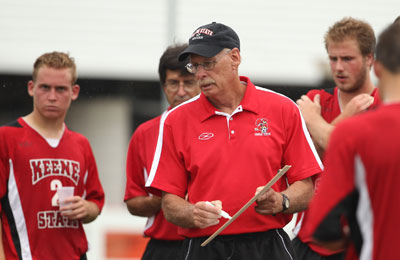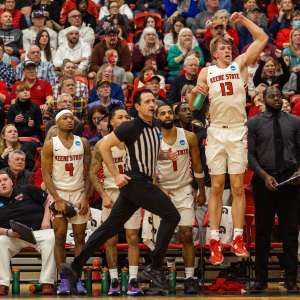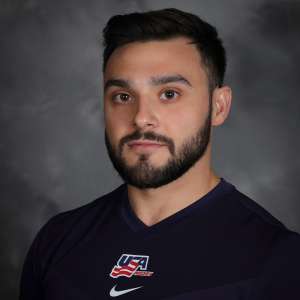Butcher Reflects on Coaching Career at Keene State

Typically sharing the Owl Athletic Complex with other teams, the Keene State College men’s soccer team, playing against Western Connecticut State, will be the only show in town on Saturday – and rightfully so.
While the game certainly holds significance for the 5-10 Owls, who are clawing their way back into the Little East Conference playoff picture, the soccer spotlight will shine on the sidelines as Keene State celebrates the long and highly accomplished 43-year coaching career of Dr. Ron Butcher, who might be patrolling the sidelines for his final home regular season game.
“I used to say in my class that the journey is better than the end. And the same thing holds true in coaching,” said Butcher. “I’ve been to some amazing places, I’ve worked with some amazing coaches – and most said to me, I can’t believe you won’t be on the sidelines. What are you going to do? Some of the guys even asked me if I wanted to be their assistant coach. At least people know who I am and appreciate what I accomplished during my coaching career.”
You would need both soccer nets to hold all the accomplishments and accolades Butcher has accumulated during his rewarding career. Since arriving at Keene State in 1970, he has been the chief architect in building an Owl soccer program that has flourished at every level of college competition from NAIA to NCAA Division II and Division III while amassing 594 victories, placing him fifth on the all-time list for a men’s college soccer coach and third among active coaches in Division III. The dean of men’s soccer coaches in New England, Butcher has not only led the Owls to 31 post-season tournament appearances, but has developed numerous All-America, All-New England and All-Conference players, as well as some who have gone on to play in the professional ranks.
Growing up in Weston, Mass., Butcher saw himself taking a different career path. Deciding not to join the family construction business and discounting high school tests that said his aptitude was for plumbing, Butcher had an inkling that he belonged in sports. “Actually, I wanted to be a baseball or football coach, but I got the soccer bug at Plymouth State College,” Butcher said.
Butcher did try his hand at coaching baseball at KSC, but soon found out the sport wasn’t for him. “We went up to play Castleton State for a doubleheader, and by the third inning of the second game it was about 27 degrees and I was freezing my butt off,” he said. “So I gave that up and said soccer is what I really want to do.”
Honing his soccer coaching skills at Pittsfield (N.H.) High and later at Wisconsin-Platteville, where he got a chance to pick the brains of players and coaches running many of the ethnic leagues and camps in the area, Butcher, a goalie by trade, was encouraged to look into the Keene State job by then-athletic director Ted Kehr and basketball coach Glenn Theulen. “I was brought here to build a program and that’s what I did,” said Butcher. “They wanted a team that students could rally around.”
Butcher didn’t disappoint them. Bringing in players from England and later Montreal, his teams became juggernauts in the NAIA, reaching the national tournament multiple times throughout the ’70s and early ’80s.
Although his teams lacked the scholarships of its counterparts in the old New England Collegiate Conference, the Owls still found a way to win in Division II. Moving to Division III in the fall of 1997, KSC earned an NCAA berth in eight of its first 10 seasons in the Little East Conference. “I can only speak for myself. Keene State soccer over 43 years has had a pretty good run when you look at the record and the number of athletes who have graduated from the program and experienced the thrill of competing in post-season tournaments,” said Butcher.
Not afraid to voice his opinion, Butcher was vehemently against the program’s move to Division III and even thought about leaving. “When we went from Division II to Division III I wanted out of here so bad, but I found out the grass isn’t always greener on the other side,” he said. “At the time I was still teaching and I found out my ego wasn’t big enough to take a $20-to-30,000 pay cut.”
Right or wrong, Butcher contends that he has been dealt a bad hand when it comes to his attempt to elevate his program over the years. The disparity of scholarships in Division II gave way to the inequity in financial aid packages offered in Division III, providing a distinct disadvantage when it comes to the life blood of a program – recruiting.
“Now when you find a good player there are five other schools whom we play who are looking at that same kid,” Butcher said. “The kid might want to come, but he ends up going to the other school because it’s cheaper. It’s devastating because I end up playing against these kids.”
That, coupled with the problem of not having the strong recruiting base of other LEC schools like Rhode Island College and UMass-Dartmouth that have a multitude of high schools with talented players in their own backyards, has left Butcher playing on an uneven field. “I have done more with less at Keene State College than most other coaches in New England. Unfortunately, it’s caught up with the program.”
Butcher acknowledges that today’s student athletes have a lot on their plates, scurrying to keep up with class, job and social obligations – ultimately making his job even tougher. “I got guys running from class to practice and guys running from practice to class. I never get a chance to teach everything I want to teach,” he said. “Coaching is the highest form of teaching, in my opinion. I am graded twice a week on what we do. And when my classroom is interrupted each and every day it makes it hard to get a straight A all of the time.”
When you coach as many years as Butcher has, change is inevitable. “I’ve changed because the student athletes have changed. I’ve changed because I’ve been asked to change. I’ve changed because athletes today are very fragile. You have to be careful what you say to them, how you say it to them, how you look at them. Has it worked? Not necessarily for me.
“Many of my alums come back and say, Butch, you’re a cupcake now. We enjoyed those days when you were relentlessly on our tail. It was a challenge to us and we accepted the challenge. It just doesn’t happen today. Kids don’t accept the challenge.” As much as people revel in his record, Butcher knows that it always has and always will be about the players. “Everybody looks at a coach and says wow – look at that record. I look at it and say I couldn’t attain this record without those players who put up with me. Some of those guys didn’t like me every day and some didn’t like me until they graduated, but you know what? They would run through a stone wall for the program. They would do anything to win.”
This season hasn’t been easy for Butcher. For the first time in program history, the team dropped its first five games of the season and it’s been an uphill battle ever since. “We’ve been struggling to score and find that competitive edge all season,” Butcher said. “I’m still looking for answers.”
Unlike past seasons, Butcher admits he hasn’t been able to leave the game on the field and shield his wife, Christine, from his disappointment. “She understands and knows right now I’m hurting inside,” he said.
Saturday will help the pain go away. A large group of soccer alums are expected to be on hand to salute and honor their former coach with pre- and postgame festivities. “It’s funny. Some of the guys retired a few years ago and I’m still going,” said the 70-year-old Butcher. “Young people make me feel young.”
If this is his final season, Butcher isn’t saying. While he feels his legacy will be tarnished by the season, there’s good reason to feel otherwise. He just has to look around and see all the grateful former players who will surround him on Saturday. He won’t forget them and they won’t forget him – even if took a while for his message to sink in.
“A lot of guys tell me, ‘Until I had kids, I didn’t really understand what you were talking to me about. But some of the things you taught me I used with my own children,’” said Butcher. “That’s what you really want to be remembered as a coach – you had some influence in their life.”





